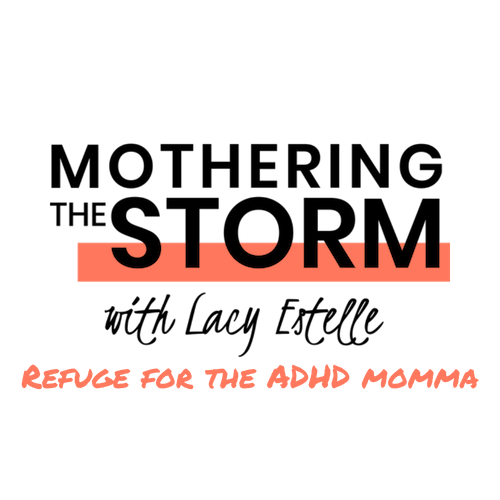This post may contain affiliate links. This means, if you make a purchase from a link on this page, I may receive a small commission at no extra cost to you. You can find our entire disclaimer here.
Tell someone else!
Getting ready to go back to school can be a hectic time for any family. Throw in the added challenges that come with ADHD and it can be down right daunting. It doesn’t have to be though! I’m sharing 5 tips to help your family survive the back to school transition.
There is so much that goes in to getting ready to head back to school that it can be easy to overlook the actual school days themselves. A little planning ahead for those days can help a lot when it comes to surviving the back to school transition. Below is a list of 5 things that can help you and your child make the most of this school year.
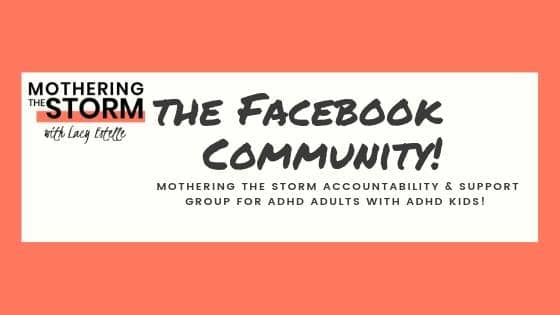
Click Here to Join the Mothering the Storm Facebook Group! An Encouragement Group For Parents who have ADHD and are also caring for an ADHD Child!
My hope is that these tips will help make the transition (and the rest of the year) smoother. I know the school shopping, doctor appointments, orientations, and paper work can feel overwhelming. But hopefully you will be able to take some time to think about how these tips can help smooth the way for your family!
Back to School with ADHD: 5 tips to help your family survive the transition
Below is a list of 5 ways to make back to school easier for your family. Some of them you may already be planning for. Others may need to be tweaked a bit to work the best for your crew. All of them have helped me and my kids set ourselves up for success.
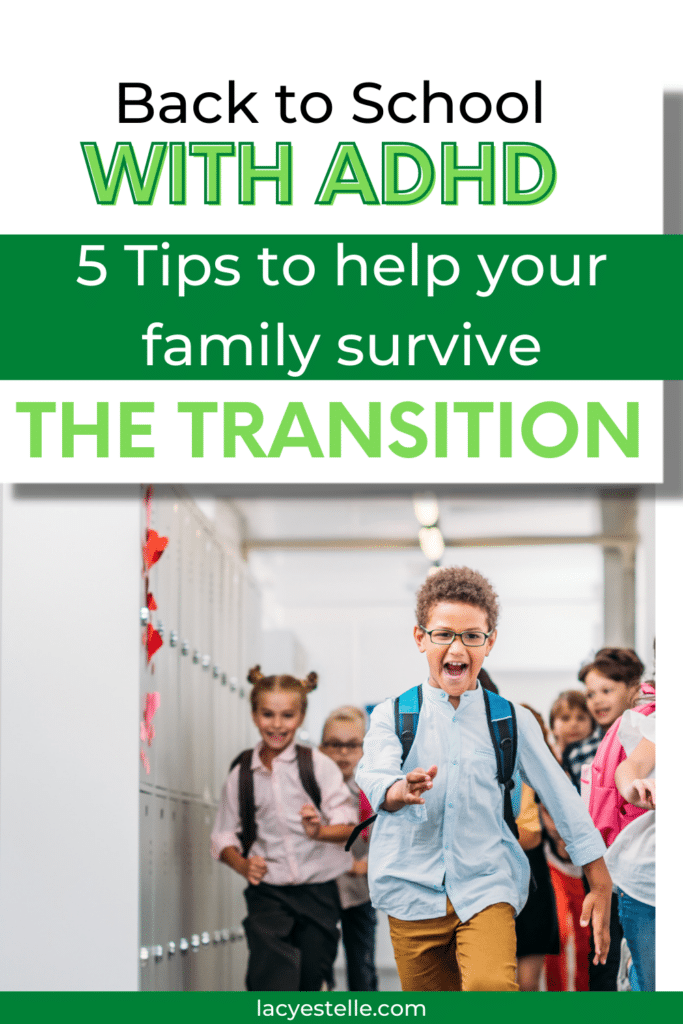
Tip 1: Make Bed and Breakfast a Priority
One of the best things that we can do to help our kids be successful in school is to make sure they get the right amount of sleep. For most kids this is around nine hours a night. Planning out our night and morning routines can ensure that they are getting the restorative shut eye they need.
Getting enough sleep helps with attention, focus, and overall well being. Sadly, many of us adults know how hard it can be to function without enough sleep. It is even harder for our ADHD kids to thrive when they are overtired. Impulse control and the regulation of emotions can be far less challenging with enough sleep.
Our whole lives we have heard about breakfast being the most important meal of the day. This still holds true and is especially important for our school kids. Making sure that our ADHD kids get a breakfast that is high in protein can give them the proper kind of energy they need to do well.
Giving our children more protein and less sugar in the morning helps reduce restlessness. It also makes sure that they have a steady stream of energy that will get them through until their next meal. The full feeling from protein lasts longer than sugars and will lower the chances of becoming distracted by hunger.
Tip 2: Exude Positivity
For ADHD kids, school can be intimidating. Instead of the back to school excitement that many kids experience our children often face anxiety. Positivity from us can go a long way in lowering that anxiety. Focusing on the parts of school that we know our children enjoy can build on the excitement and lower anxiety.
As parents of ADHD kiddos we face a lot of challenges ourselves. There is just more to back to school for us than there is for parents of neurotypical children. And recent school years have added even more concerns to our plates. It is important that we don’t complain about these things in front of our children.
I am not saying that we shouldn’t talk about them, we absolutely need to. We just need to do it somewhere where our kids can’t overhear. Keeping discussions about school as positive as possible will help our kids to stay positive about it too.
It is also important for us to find ways to be positive about our children’s behavior and performance. When our kids get their shoes on after being asked only once, we should notice it and praise them for it. It can be easy to focus on the struggles our kids are having and overlook the wins. Focusing on the wins, however, can really help build self esteem and confidence.
If you can, be specific as possible with your praise. Instead of just “Good job Bud” name the behavior and praise the skill they used to make it happen. Whether it’s listening, focus, or sticking to the routine, bring it up. Try something like, “Great listening, you got your shoes on when I asked and now we can leave on time.”
As they say “catch them being good”. Not only does it build positivity and confidence it also provides great coaching opportunities. Our kids often hear that they aren’t good listeners and can easily internalize that and perpetuate the problem. Finding opportunities to tell them they are good listeners can help reverse that.
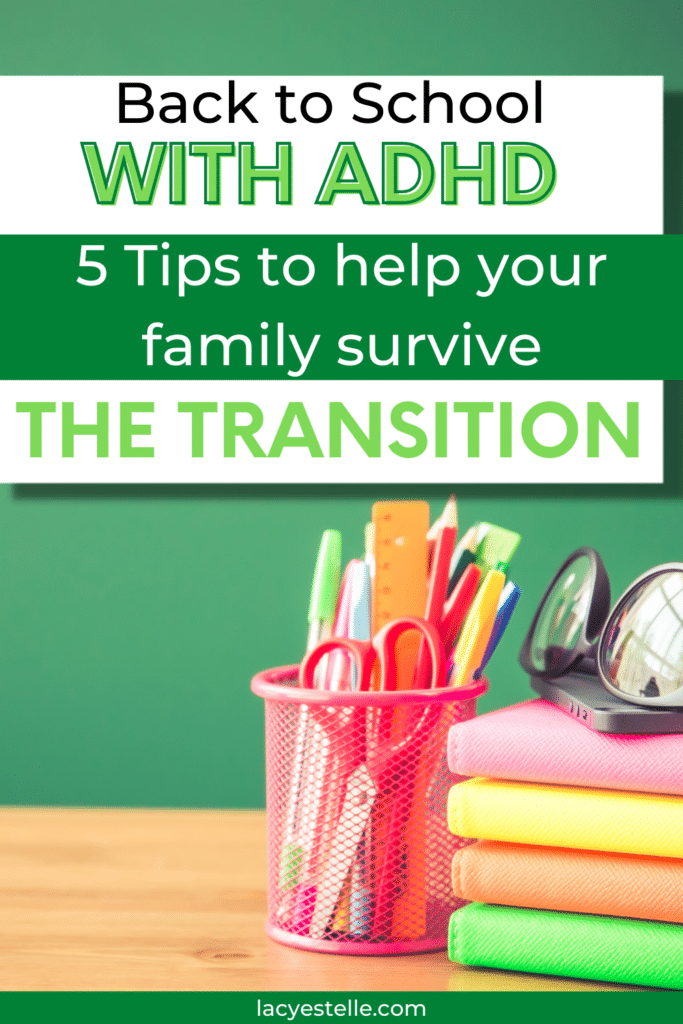
Tip 3: Establish Good Routines
It is no secret that our tiny humans thrive on predictability. When kids know what to expect, anxiety levels are much lower and comfort levels rise. Routines and set schedules help kids to anticipate what is coming next and mentally prepare for it. Repeating the same steps in the same order at bed time and in the morning are great places to start with routines.
Think of how unsettling it would be if you were in the middle of writing an email and someone came in and told you there is a meeting starting right now that you had no idea about. It is just as unsettling for our kids when we move them from one thing to the next without any warning.
Schedules obviously have to change from day to day depending on what is going on. Routines, however, can still be used to help smooth out the days. Also, letting kids know ahead of time what the schedule will look like for the day can be very helpful.
At night, you can tell your kids what the plan is for the next day. Then, in the morning you can remind them of the day’s schedule. It can also be helpful to preview the next couple of days. It doesn’t need to be detailed, just an idea of what is coming so they can start to process it.
“Today we are doing this, this, and this. Tomorrow we have a doctor’s appointment, and the next day we are going to the pumpkin patch.” Depending on the child and their attention level, you may want to talk about today then wait a bit before bringing up the preview of the next days.
Tip 4: Have Realistic Expectations
We start every school year determined that it will be a good one. And we should definitely keep striving for that. But we should also gift ourselves and our children with realistic expectations. That way we don’t set ourselves up for anxiety and disappointment.
Realizing that we are not going to achieve perfection in areas where the struggle is real is half the battle! Striving for progress and not perfection can relieve a lot of stress. If your child’s grades aren’t the best, that’s ok. Remember that the ultimate goal is learning. If we focus on the individual wins instead of the overall grades we take some of the stress off of us and our children.
We can also help by knowing when we can encourage independence and when our kids will need more help. If my child struggles to get themselves dressed or gather their school items on their own I realize that helping them with this will avoid some battles and discouragement.
If organization is the struggle, walk them through those processes but then find an area of strength where they can practice independence.
Keep this in mind when it comes to routines too. It can be a good idea to figure out just how much time your child needs to complete morning tasks without the added stress of rushing. That way we can try to make sure they have that time. Having realistic expectations can help us to develop a routine that we can actually stick to each day.
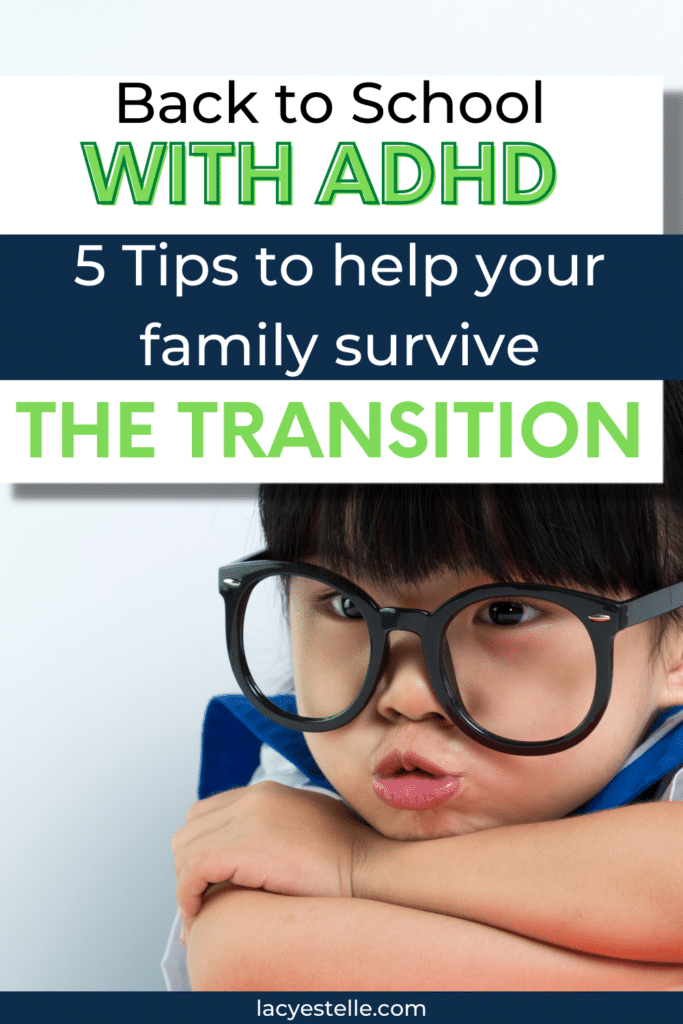
Tip 5: Help the School Help your Child
In most states there are laws in place that make certain resources available to help your ADHD child. Become familiar with those resources so that you can make sure your child is getting the help that is available to them. This will look a little different in each state but programs like independent education plans (IEPs) can be very helpful for ADHD kiddos.
You can also talk to your child’s teacher about their struggles, triggers, and strengths. If the teacher knows what has and hasn’t worked for your child in the past they can better help your child. This will also alleviate stress for your child since the teacher won’t be starting from scratch trying to determine the best ways to educate them.
Everyone wants to see your child do well and if everyone is working together it can really help to make your child’s school year a success. If you find that your child does really well at school but still has big behavior struggles at home, check out our post The Truth About Why Your ADHD Kid Behaves at School But Not For You to learn why!
Back to School with ADHD: 5 tips to help your family survive the transition
It takes extra energy and patience to be the parent of an ADHD child. And even more so when you are an ADHD parent. As a bonus tip I want to remind you to take care of yourself. The school year is long and we need to prepare ourselves for a marathon rather than a sprint.
So make sure you are spending at least a little bit of time focusing on you. Find ways to rejuvenate and relax. Remember that we can’t be the best version of our parenting selves when we are running on empty.
I pray that you and your family have an amazing school year! Let me know in the comments what back to school strategies have worked for you in the past. Or which of these tips you are excited to try. And remember, we can do this! One little step at a time.
